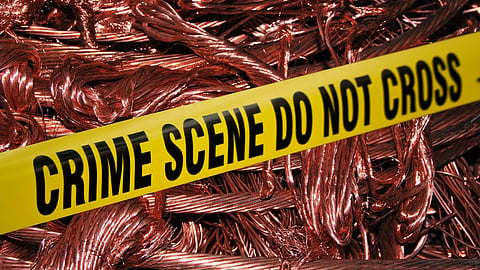Rampant copper theft threatens SA economy – estimated loss of R46.5 billion annually
South Africa is grappling with a significant problem: the rampant theft of copper, which is estimated to cost the country a staggering R46.5 billion each year, according to the Economic Sabotage of Critical Infrastructure (ESCI) Forum. With the demand for copper projected to skyrocket in the coming years, driven by renewable energy and electric vehicle technologies, the situation is expected to worsen. South Africa's vulnerability lies in its informal settlements and the allure of quick cash offered by scrap merchants. Despite efforts to curb the theft, including a ban on scrap metal trade, the illicit export of copper continues, posing a severe threat to the economy and industries that heavily rely on recycled copper.
This crime is killing South Africa
By Myles Illidge
The theft of copper in South Africa is estimated to cost the country R46.5 billion a year, according to the Economic Sabotage of Critical Infrastructure (ESCI) Forum.
With demand for the mineral only expected to increase significantly in coming years, the situation could deteriorate.
According to executive chairperson of Copper Development Association Africa, Evert Swanepoel, demand for copper is expected to rise from around 25 million to 60 million tonnes per year by 2050.
"One of the biggest problems we have is the demand for copper globally. The global copper world is worth about 25 million tonnes a year. That is set to increase to about 60 million by 2050," Swanepoel said in an interviewwith 702.
He explained that renewable power and electric vehicles are the major drivers behind the expected increased demand.
"The main driver behind that demand is alternative energy, or otherwise what we know as solar energy, photovoltaics, and of course wind turbines, as well as electric motor vehicles," said Swanepoel.
"The world can't keep up with the demand for copper, and wherever copper is available and can be exported, it is, and unfortunately, South Africa is one of those countries where the export of copper is destroying our infrastructure and costing a lot of money."
When asked why this kind of theft isn't as rampant in other countries as in South Africa, Swanepoel said two aspects make it an attractive commodity for thieves.
"Not many of these countries would allow the export of copper to other countries. That's number one," he said.
"Number two, I don't think they have the unfortunate infrastructure of informal settlements as we have it."
He used the example of a family living in an informal settlement without employment or money.
"A scrap merchant offers you R50 a kilogram for copper. Obviously, one would take this as you have no other income," Swanepoel said.
"I think worldwide we haven't quite got that same problem."
He explained that the individuals who risk their lives to get a few kilograms of copper — such as in the example above — are merely "foot soldiers".
"It goes from one small scrap merchant to a bigger one, and eventually, it gets to the fat cats, and these guys are very well connected," said Swanepoel.
"The copper is exported legally and, to a greater extent, illegally."
Regarding initiatives to block the export of stolen copper, Swanepoel referenced a Department of Trade, Industry and Competition decision to ban the trade of scrap metal in South Africa from January 2023.
"South Africa has prohibited the export of copper scrap since the beginning of January, but I don't think it has made any real change," said Swanepoel.
"It's still being stolen, and it's now going out illegal routes, and the copper cable is being melted into big blocks, billets, or they call it ingots, which are exported overseas."
"Now, a billet is a legal tariff item, and it can be exported legally," he added.
Swanepoel noted that, despite there being record of these billets being exported, it is almost impossible to prosecute those responsible.
"It's very awkward to do that because once the copper is melted, it's very difficult to say it's stolen or not stolen," he said.
"Although we know the names of these legal and illegal merchants, it's very difficult to take a matter like that to court if you haven't got the evidence."
Read more: South Africa's crime epidemic: A nation in crisis
Copper theft a threat to manufacturers in South Africa
Swanepoel highlighted another aspect of the South African economy damaged by copper cable theft.
"Many of our large manufacturers use recycled copper in their production processes. Now, without that copper, they won't have a business," he said.
He said Copper Development Association Africa is negotiating with government to stop even the legal export of copper and to change specific policies.
"Cash for scrap is one item that really should be stopped. If there is no cash and it is all done by EFT, there's going to be a trail of transactions,"
"Another one is the auditing of these well-known merchants. Then, of course, we believe we should nail the access to ports. There should be one port only for the export of copper scrap."
He explained that these actions could help curb copper theft, allowing state-owned companies like Transnet to operate as they should.
Read also:
- SA's growing organised crime epidemic: is it becoming a "Mafia State?"
- SA a failing state on the cusp, stirring analysis from Dr Edward Mienie
- Everybody has a price in South Africa's booming kidnapping-for-ransom market
This article was first published by My Broadband and is republished with permission

